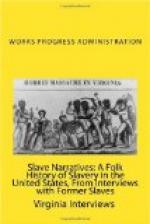I saw de blue jackets, dat’s what we called de Yankee soldiers. When we heard of our freedom we hated it because we did not know what it was for and did not know where to go. De massa say we could stay as long as we pleased.
De Yankee soldier asked my father what dey wuz all doing around der and that dey were free. But we did not know where to go. We stayed on wid de massa for a long time after de war wuz over.
De Klu Klux Klan wuz pretty rough to us and dey whip us. Der was no school for us colored people.
I wuz nearly 20 when I first took up with my first woman and lived with her 20 years den I marry my present wife. I married her in Alabama and Elder Worthy wuz de preacher. We had seven chillun, all grandchillun are dead. I don’t know where dey all are at excepting me daughter in Steubenville and she is a widow. She been keepin’ rooms and wash a little for her living.
I didn’t hear much bout de politics but I think Abraham Lincoln done pretty well. I reckon Jefferson Davis did the best he knowed how. Booker T. Washington, I nebber seen him, but he wuz a great man.
Religion is all right; can’t find no fault with religion. I think all of us ought to be religious because the dear Lord died for us all. Dis world would be a better place if we all were religious.
Word Picture of MR. MCMILLAN
Thomas McMillan, 909 Morris Ave., Steubenville, Ohio. He lives with his wife, Toby who is over 50 years old. He makes his living using a hand cart to collect junk. He is 5’6” tall and weighs 155 pounds. His beard is gray and hair white and close cropped. He attends Mt. Zion Baptist Church and lives his religion. He is able to read a little and takes pleasure in reading the bible and newspaper.
He has seven children. He has not heard of them for several years except one daughter who lives in Steubenville and is a widow.
His home is a three room shack and his landlord lets him stay there rent free. The houses in the general surrounding are in a run down condition.
Wilbur Ammon, Editor
George Conn, Writer
C.R. McLean, District Supervisor
June 16, 1937
Folklore
Summit County, District #9
SARAH MANN
Mrs. Mann places her birth sometime in 1861 during the first year of the Civil War, on a plantation owned by Dick Belcher, about thirty miles southwest of Richmond, Virginia.
Her father, Frederick Green, was owned by Belcher and her mother, Mandy Booker, by Race Booker on an adjoining plantation. Her grandparents were slaves of Race Booker.
After the slaves were freed she went with her parents to Clover Hill, a small hamlet, where she worked out as a servant until she married Beverly Mann. Rev. Mike Vason, a white minister, performed the ceremony with, only her parents and a few friends present. At the close of the ceremony, the preacher asked if they would “live together as Isaac and Rebecca did.” Upon receiving a satisfactory reply, he pronounced them man and wife.




